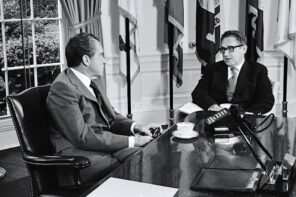Despite the public flogging that Pastor John Hagee has recently received, it is too early to cast him off to the dustbin of history. While he may no longer be accepted aboard Senator John McCain’s “Straight Talk Express” nor have such easy access to the congressional offices of a bevy of Jewish legislators (many of whom have welcomed him with open arms in the past), it is unlikely that either Hagee’s Christians United for Israel (CUFI) or his San Antonio megachurch will be closing its doors anytime soon.
Thanks to the steadfast work of Talk2Action’s Bruce Wilson, Hagee has become a YouTube must-see and the object of some ridicule, unlikely to receive a free pass from the mainstream media. Over the past several months as Hagee’s objectionable remarks about Catholicism, Islam, Hurricane Katrina (punishment for New Orleans’ embrace of gays), and Hitler (whom God sent to hunt the Jews and force them to Israel) have been revealed, the feigned surprise of some of his conservative colleagues evokes memories of Casablanca, in which Captain Renault tells Rick Blaine, the owner of an upscale club and gambling enterprise, that he is “shocked, shocked, to find that gambling is going on in here!”
“I think the validation given by the mainstream media to the proposition that some of John Hagee’s statements and writings—in this case Hagee’s assertion that ‘God sent Hitler’ and that Jews aren’t ‘spiritually alive’—are anti-Semitic, is a breakthrough moment,” Bruce Wilson told Religion Dispatches. “Tens of millions of Americans have seen my video on TV and read Hagee’s statements in newspapers, and the media treatment of Hagee’s statements has not been, for the most part, very favorable.”
“The volatile views of Hagee and some other leading Christian Zionists have been an elephant on the table of American politics for decades,” Fred Clarkson, the co-founder of Talk2Action told RD. “Many books and articles have been written documenting them and detailing the political dangers; not only to Israel and the Middle East, but to the integrity of American politics and public policy.”
How will the revelations effect the Christian Zionist movement in general and Hagee’s standing within it? Will leading Jewish organizations such as American Israel Public Affairs Committee (which gave Hagee the royal treatment at its own conference last year), other Jewish religious leaders, a bevy of Jewish neoconservative Hagee boosters (who have supported Hagee’s hectoring of the Bush Administration to act more muscularly toward Iran), as well as his own followers, turn on him?
Since its founding in 2006, both Hagee and CUFI Executive Director David Brog have tried to steer clear of talk about Israel figuring into any End Times scenarios or of the mass conversion of Jews as an element of it. During its first major congressional lobbying efforts in July 2007, Brog stressed three talking points: “Stopping Iran,” “Stopping Hezbollah,” and “Providing Military Aid to Israel.”
“Christian Zionism is an integral element of the most dynamic sector of the religious right, and John Hagee has been its leading figure since the death of Jerry Falwell and the semi-retirement of Pat Robertson,” Clarkson pointed out. “This episode will exacerbate the existing tensions between McCain and much of the religious right; and certainly dampen enthusiasm for his candidacy among the high energy and highly capable activists that have made the religious right a political powerhouse in American elections for a generation.”
The relationship between conservative Christian evangelicals and Jews has been suspect for a long time. In October 2002, in an opinion piece for the Washington Post, Gershom Gorenberg, the author of The End of Days: Fundamentalism and the Struggle for the Temple Mount, warned that the relationship between conservative Christian evangelicals and Israel was “a strangely exploitative” one. The acceptance of it, “pose[d] problems of principle for Jews and Israel, in return for an illusory short-term payoff.”
Gorenberg wrote of the essential contradiction that informs the relationship:
The Christian right’s view of Israel derives largely from a double-edged theological position. Following a classic anti-Jewish stance, it regards the Jewish people as spiritually blind for rejecting Jesus. Yet it says that divine promises to Jews (to bless those who bless them, to return them to their land) remain intact. Indeed, it regards Israel’s existence as proof that biblical prophecies are coming true; heralding an apocalypse in which Jews will either die or accept Jesus. Israel is loved as confirmation of fundamentalist Christian doctrine.
“We are now seeing a tectonic shift in American politics,” observes Clarkson. “A chasm has opened as the problematic nature of accepting or ignoring, the anti-Jewish views (and apocalyptic politics) of many Christian Zionists, in exchange for political support for the state of Israel, is more widely exposed and understood than ever before. There is little ambiguity in Hagee’s views, and there has been no way to get around their horrific nature.”
So while that sucking sound you hear might be the air coming out of the Christian Zionist balloon, CUFI is nevertheless going ahead with plans for its third annual “Washington-Israel Summit” toward the end of next month at the Washington DC Convention Center. It is likely however that the controversy surrounding the scheduled confab will keep Hagee in the news cycle for at least another month or so.
While McCain has rejected Hagee and will not be seen anywhere near the event, among the scheduled speakers are CUFI Board Member Gary Bauer, Daniel Pipes, former senator Rick Santorum, Charles Jacobs of the David Project, Dennis Prager, William Kristol, Israel’s US ambassador Sallai Meridor, AIPAC’s Brad Gordon, and Senator Joseph Lieberman.
Despite pleas not to attend the Washington meeting from a number of organizations, including the newly-formed Jewish group J Street (which has partnered with Democracy for America in an effort called “Say It Ain’t So, Joe”), Lieberman appears, as of this writing, steadfast in his willingness to stand with Hagee.
“It’s now necessary for us to look at the totality of (Hagee’s) views,” Abraham Foxman, national director of the Anti-Defamation League (ADL), told Jewish Week in an interview. While the battle engages more participants, CUFI’s executive director David Brog claims that the pastor’s words were taken out of context, recently pointing out that the attack on Lieberman is an “unfortunate” example of people “trying to divide the Jewish community and the pro-Israel Christian community.”
One of Hagee’s more vigorous defenders is Rabbi Aryeh Scheinberg, of San Antonio’s Congregation Rodfei Sholom, who wrote on CUFI’s Web site that it was “ironic and absurd that when Pastor Hagee was lecturing on one of the Jewish perspectives of the Holocaust that his words were twisted and used to attack him for being anti-Semitic.” Scheinberg also called Hagee “a world leader in his support of Israel.”
Hagee and Scheinberg go way back. In a story entitled “Our Jewish Roots” published in JHMagazine, Hagee tells of a June 1978 visit to Israel where he “went… as a tourist and came home a Zionist.” When he returned home he decided to organize “A Night to Honor Israel.” According to Hagee’s account, Scheinberg “pressed the Jewish Community into taking a chance and extending its hand in mutual friendship.” The rabbi, pictured with Hagee in several photographs, delivered the benediction at the first “A Night to Honor Israel” event in 1981; he’s been a regular participant ever since.
“Christian Zionist leaders have, for decades at least, been making coded and covert anti-Semitic statements and some of them have been pushing conspiracy theories that derive historically from such works as the Protocols of The Elders of Zion,” according to Wilson. “If one thing is clear, it’s that from now on there’s going to be a somewhat heightened level of scrutiny of public speech from Christian Zionist leaders.”
“Thanks to Hagee, it is no longer possible for politicians and journalists to look the other way,” adds Clarkson, editor of the forthcoming Dispatches from the Religious Left: The Future of Faith and Politics in America. “Similarly, the lesson of the Hagee episode is that the Christian Zionist idea is spawning a politics that is powered on a revisionist view of history that explains horrific crimes as the will of God. I have no doubt that this is as shocking to most Christian Zionists as it is to everyone else.”
“Normally, remarks about the most sensitive issues of the Jewish people would cause Jewish leadership to examine a friendship,” Rabbi Haim Beliak, co-director of JewsOnFirst, told RD. “Will this happen in this case? There have been examples where certain African Americans said terrible things about Jews and that made the relationship more tenuous. I’m waiting to see how mainstream Jewish leaders will deal with Hagee’s offensive statements.”
Ironically, Beliak noted “If Jews are seen as putting the kibosh on The Rapture, Jews could be viewed as ‘killing Christ’ all over again.”




